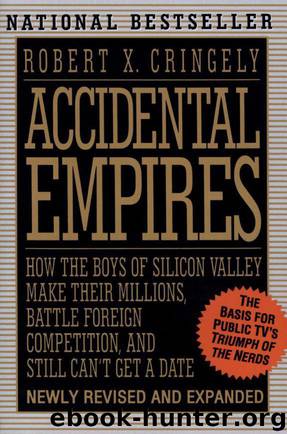Accidental Empires by Robert X Cringely

Author:Robert X Cringely [Cringely, Robert X]
Language: eng
Format: epub
Tags: Computers, Business
ISBN: 0887308554
Publisher: HarperCollins
Published: 1996-09-13T04:00:00+00:00
So how did Atkinson, Page, and Tribble get off so easily when the rest of us have to suffer through the rhythmic pattern of being ignored, then seduced, then scourged by Jobs? Simple; among the three, they have the total brainpower of a typical Third World country, which is more than enough to make even Steve Jobs realize that he is, in comparison, a single-celled, carbon-based life form. Atkinson, Page, and Tribble have answers to questions that Jobs doesn't even know he should ask.
The fourth person who has remained a Steve Jobs favorite is John Warnock, founder of Adobe Systems. Warnock is the father that Steve Jobs always wished for. He's also the man who made
ACCIDENTAL EMPIRES
► > > ► possible the Apple LaserWriter printer and desktop publishing. He's the man who saved the Macintosh.
Warnock, one of the world's great programmers, has the technical ability that Jobs lacks. He has the tweedy, professorial style of a Robert Young, clearly contrasting with the blue-collar vibes of Paul Jobs, Steve's adoptive father. Warnock has a passion, too, about just the sort of style issues that are so important to Jobs. Warnock is passionate about the way words and pictures look on a computer screen or on a printed page, and Jobs respects that passion.
Both men are similar, too, in their unwillingness to compromise. They share a disdain for customers based on their conviction that the customer can't even imagine what they (Steve and John) know. The customer is so primitive that he or she is not even qualified to say what they need.
Welcome to the Adobe Zone.
John Warnock's rise to programming stardom is the computer science equivalent of Lana Turner's being discovered sitting in Schwab's Drugstore in Hollywood. He was a star overnight.
A programmer's life is spent implementing algorithms, which are just specific ways of getting things done in a computer program. Like chess, where you may have a Finkelstein opening or a Blumberg entrapment, most of what a programmer does is fitting other people's algorithms to the local situation. But every good programmer has an algorithm or two that is all his or hers, and most programmers dream of that moment when they'll see more clearly than they ever have before the answer to some incredibly complex programming problem, and their particular solution will be added to the algorithmic lore of programming. During their fifteen minutes of techno-fame, everyone who is anyone in the programming world will talk about the Clingen-peel shuffle or the Malcolm X sort.
Most programmers don't ever get that kind of instant glory, of course, but John Warnock did. Warnock's chance came when he was a graduate student in mathematics, working at the University of Utah computer center, writing a mainframe program to automate class registration. It was a big, dumb program, and Warnock, who like every other man in Utah had a wife and kids to support, was doing it strictly for the money.
Then Warnock's mindless toil at the computer center was interrupted by a student who was working on a much more challenging problem.
Download
This site does not store any files on its server. We only index and link to content provided by other sites. Please contact the content providers to delete copyright contents if any and email us, we'll remove relevant links or contents immediately.
Pale Blue Dot by Carl Sagan(4996)
The Rules Do Not Apply by Ariel Levy(4957)
Goodbye Paradise(3802)
Ogilvy on Advertising by David Ogilvy(3607)
Liar's Poker by Michael Lewis(3441)
Delivering Happiness by Tony Hsieh(3418)
Into Thin Air by Jon Krakauer(3386)
Purple Cow by Seth Godin(3197)
Rogue Trader by Leeson Nick(3039)
The Social Psychology of Inequality by Unknown(3019)
The Airbnb Story by Leigh Gallagher(2851)
4 - Harry Potter and the Goblet of Fire by J.K. Rowling(2700)
The Mind Map Book by Tony Buzan(2570)
Bossypants by Tina Fey(2525)
Claridge's: The Cookbook by Nail Martyn & Erickson Meredith(2399)
All the President's Men by Carl Bernstein & Bob Woodward(2369)
Six Billion Shoppers by Porter Erisman(2296)
Master of the Game by Sidney Sheldon(2286)
Alibaba by Duncan Clark(2076)
